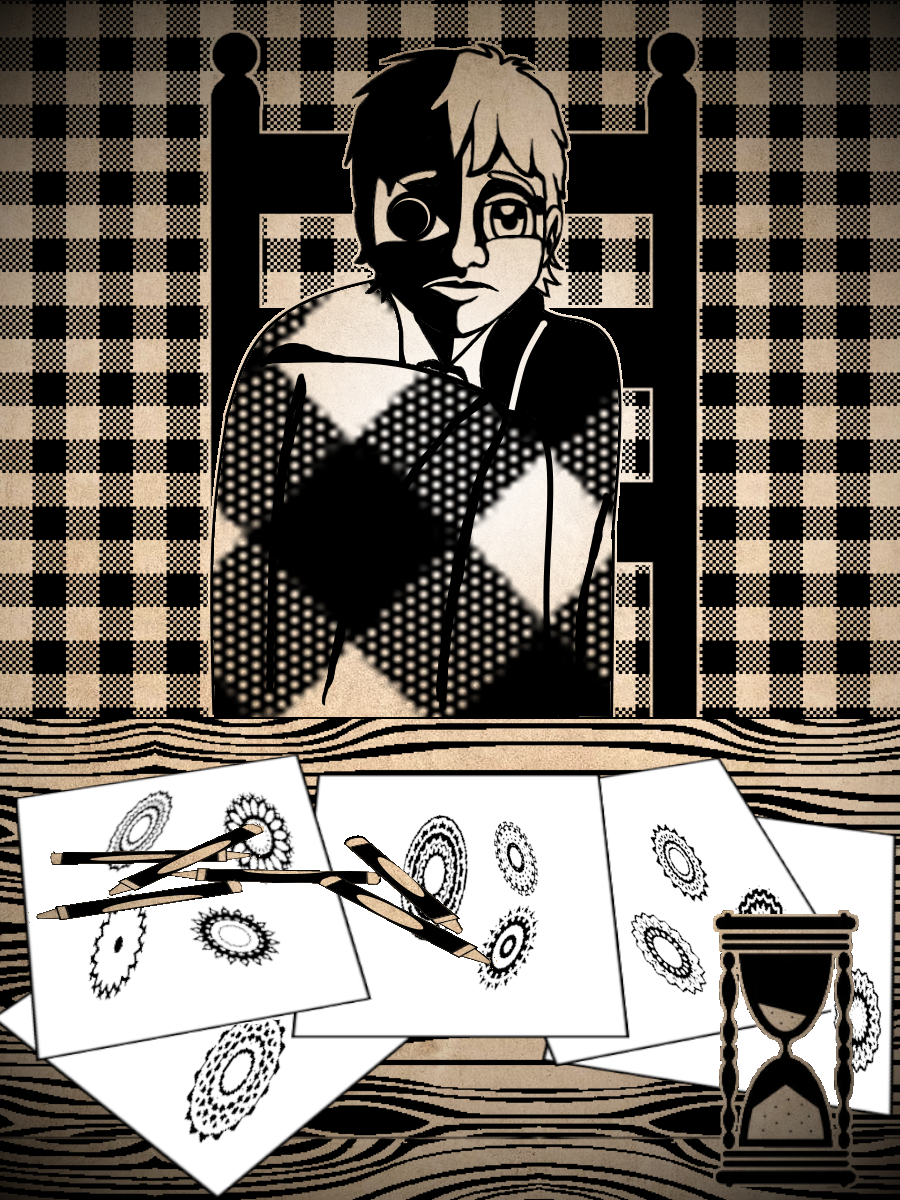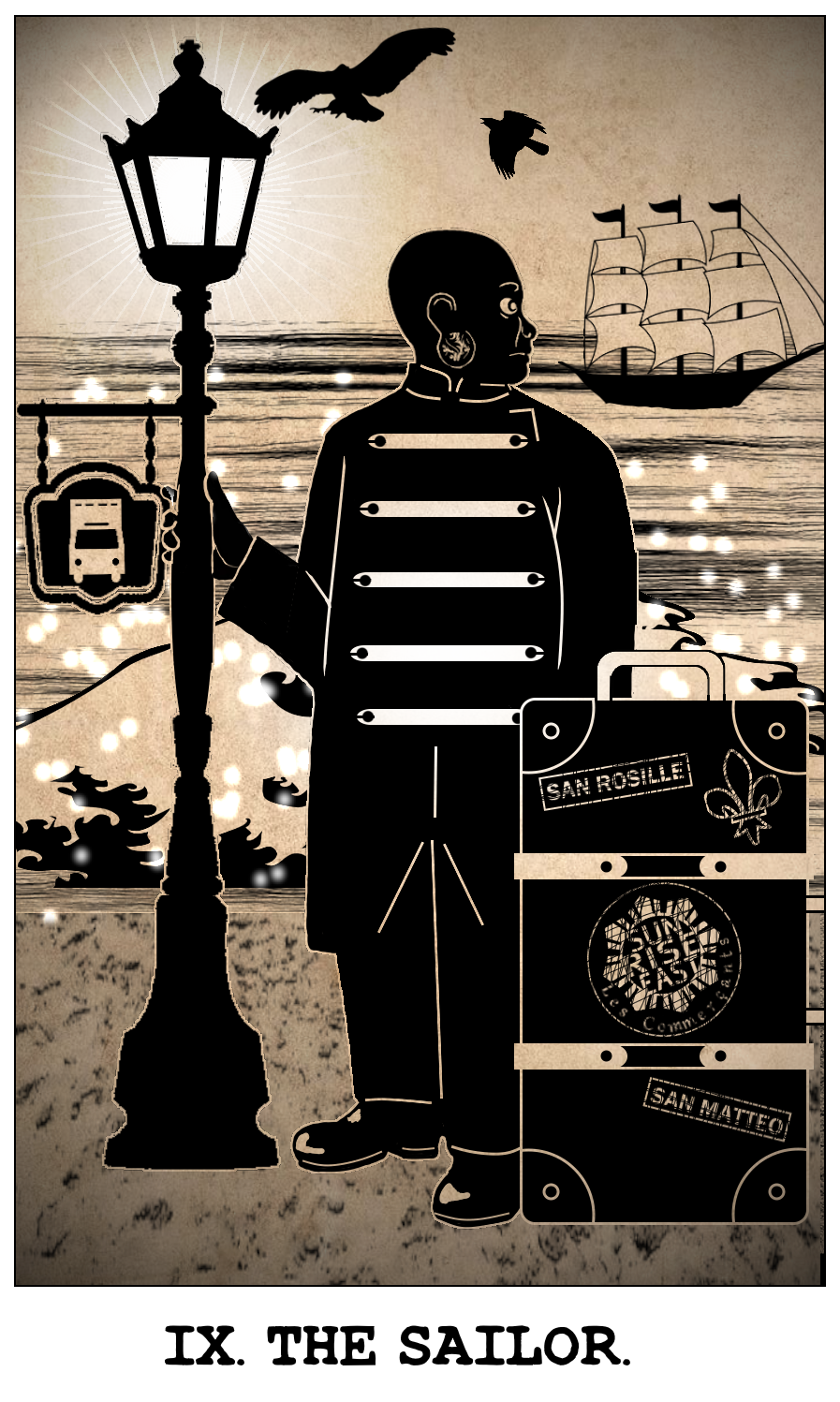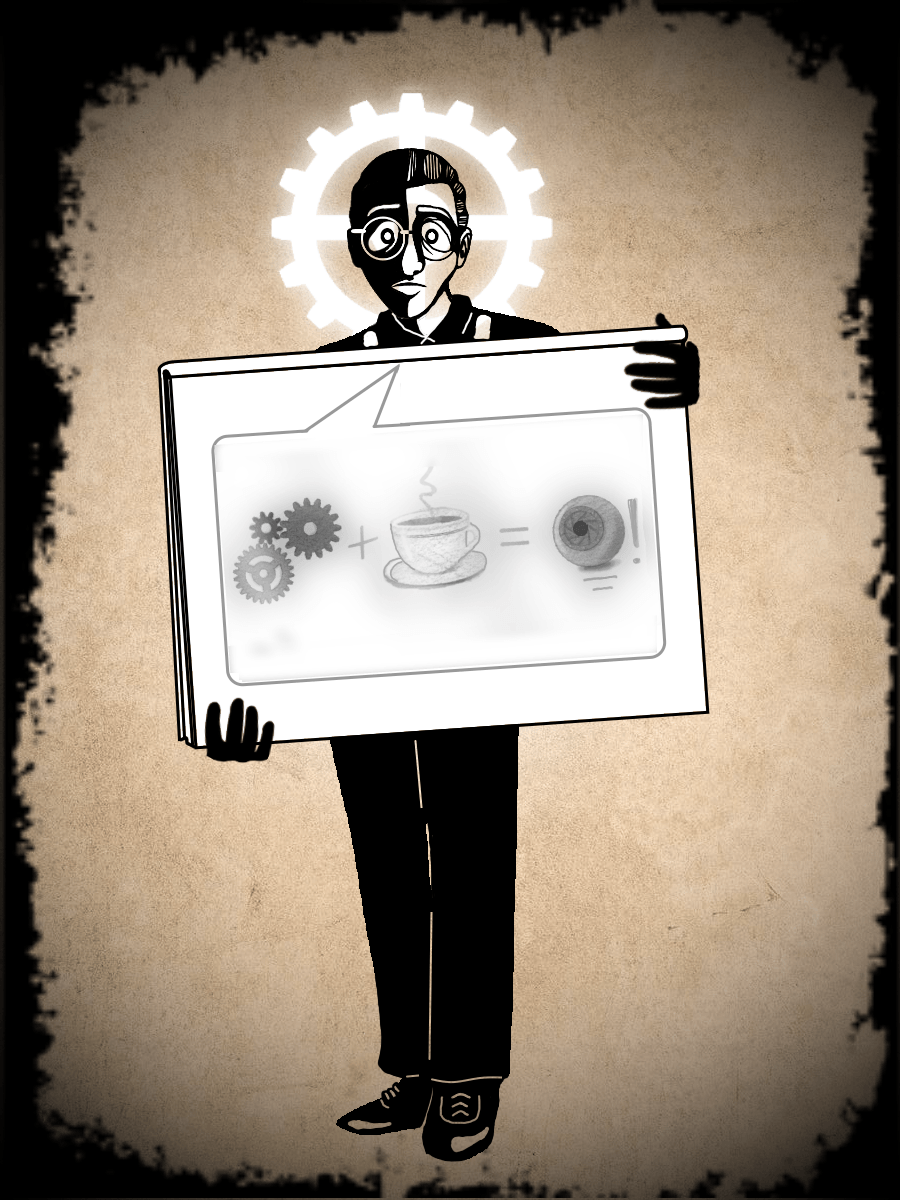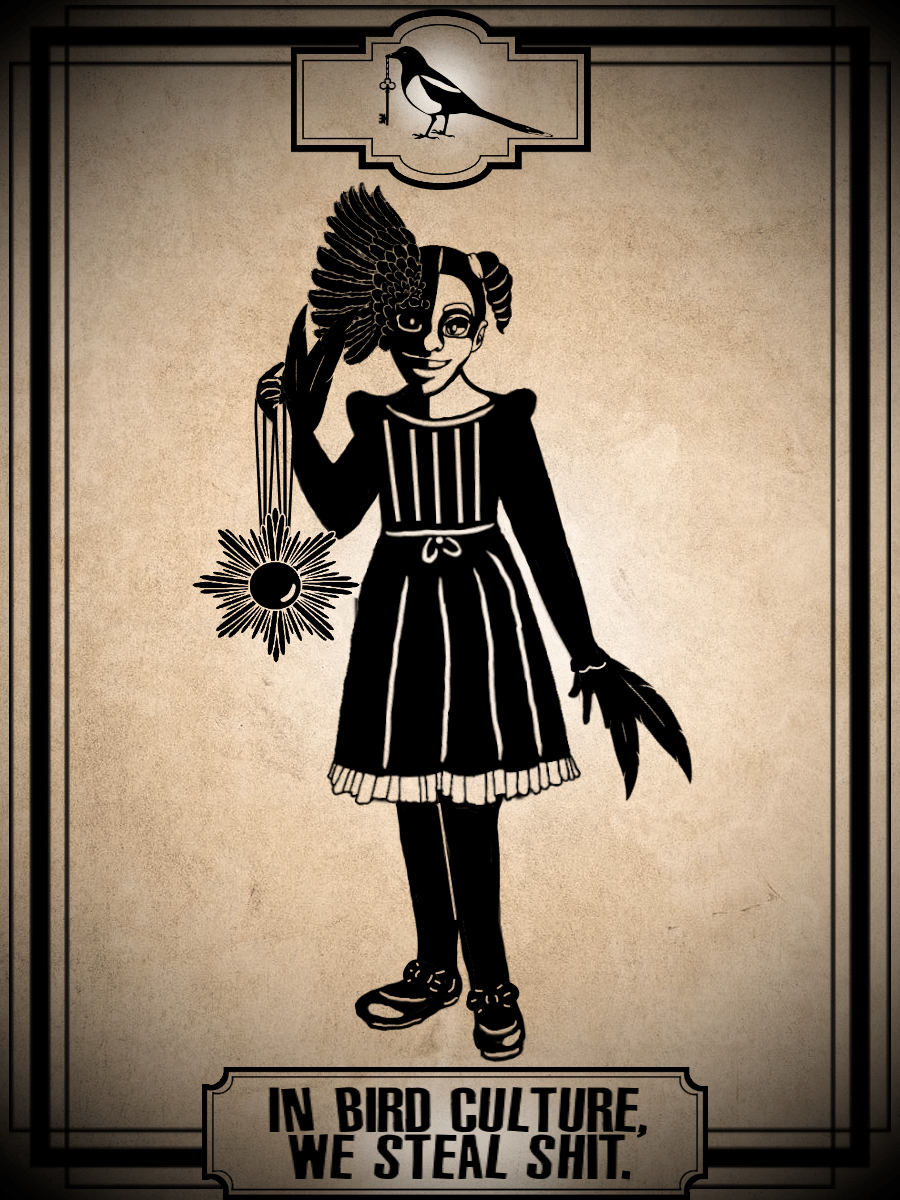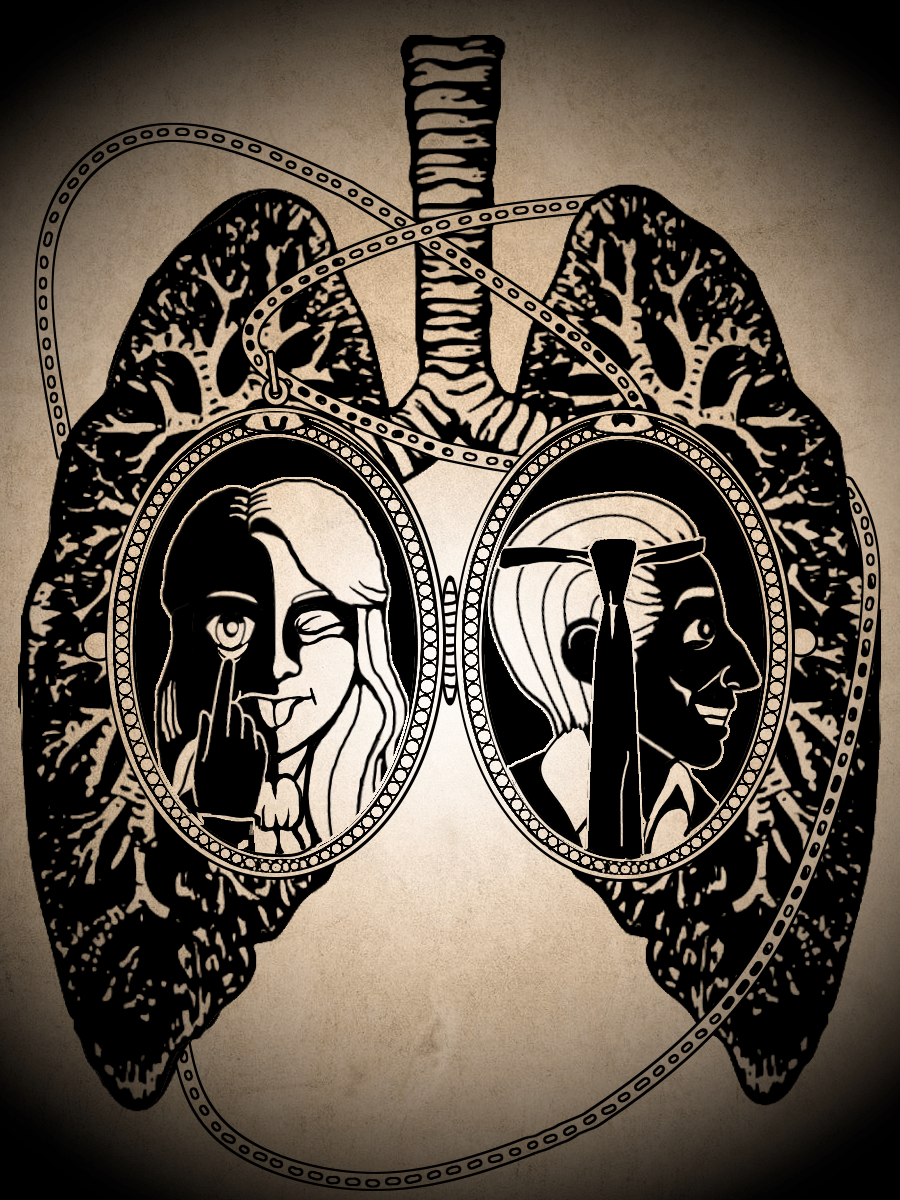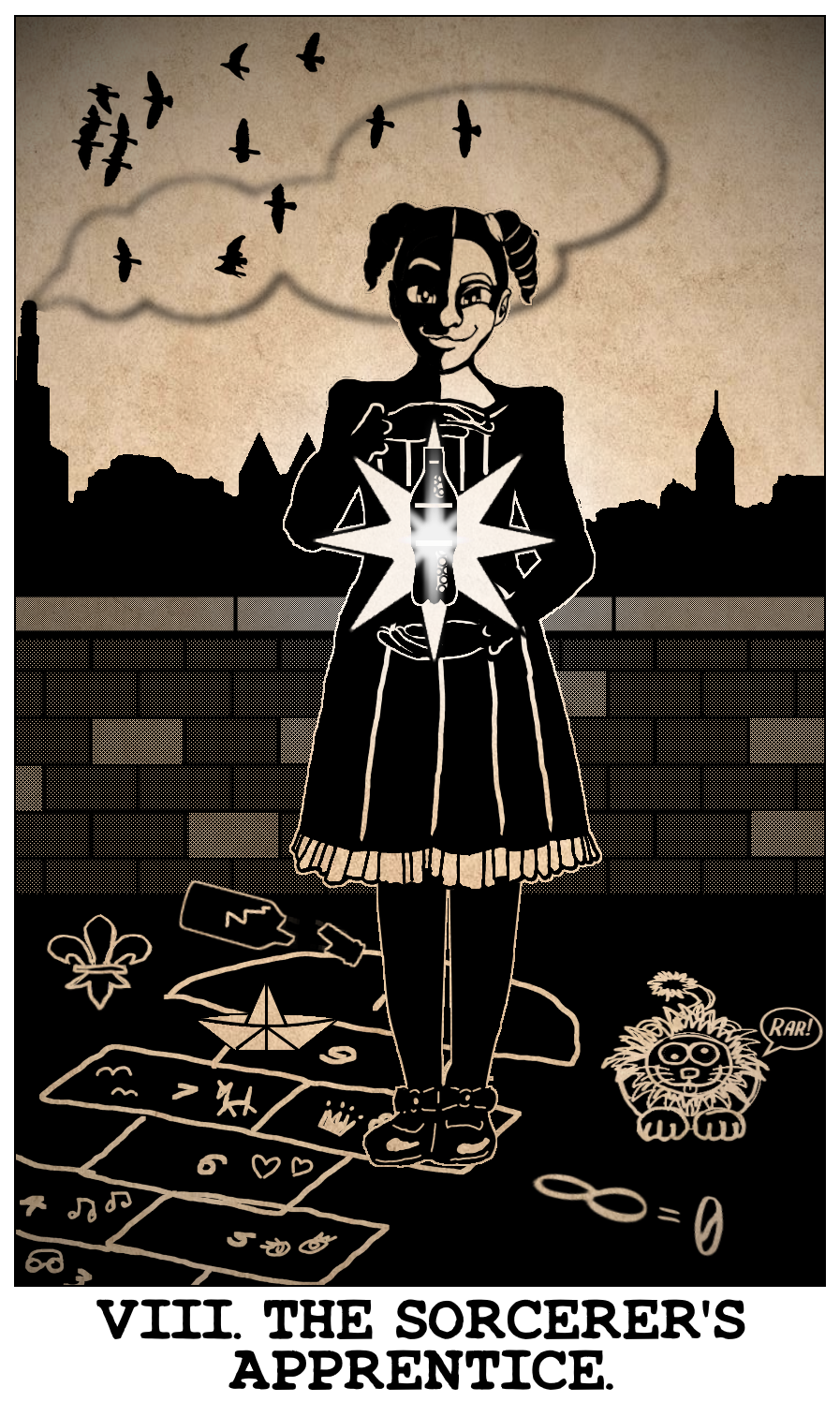Erik was lining his soldiers up on the stairs. Carefully, off to one side, so no one would get hurt by them. In order, like they came in the box. One row to a stair.
This was a lot more difficult than it should have been, because of his eye. The stairs had lines, and the tile on the stairs had lines, and the banister had lines. His eye liked lines. It would not be persuaded to look at the soldiers, not even when he held one up right next to it and moved it around.
Everything was weird and wiggling and he had to kind of ignore that and guess where to put things. He kept missing where the edges of the stairs were and trying to put soldiers on top of each other and knocking them down.
He hadn’t even got around to playing yet. He was just trying to get everything organized.
He kind of wanted to throw up.
He sighed, tipped his eye out of his head, and dropped it into his shirt pocket. Technically his eye was supposed to go back in the jelly-glass in the bedroom with the oil, but he couldn’t wear it for very long, and he got tired of having to quit what he was doing to go back and put it in or take it out.
He thought maybe tramping in and out of the bedroom all the time made his uncle nervous too.
All his shirts had oil stains on the pockets now, and Hyacinth didn’t even bother trying to wash them out.
He pulled out his watch right away to check himself. There weren’t numbers on it, and he wouldn’t have been able to tell them if there were, but there were lines around the edges past the pictures and he could count them. (Not with his eye in, obviously.) He counted twice and he was pretty sure he’d done ten.
He grinned. He only did nine last time before he needed to throw up! He’d added another!
It was starting to get on towards Pencil-Drawing-a-Letter-on-Paper, though. He had maybe fifteen lines left for soldiers. It said Crayons, but Hyacinth told him he could play however he wanted as long as he kept putting his eye in. She would check and make sure he was doing that. He didn’t ever forget he was supposed to be playing. Well, not anymore.
He thought probably because he’d added another line, he could just have soldiers the rest of the time and leave his eye in his pocket. He really wanted to get them lined up the right way. Then maybe deploy them somehow. Some kind of reconnaissance mission in the hills and valleys of one of the upholstered chairs.
He didn’t ever have battles because he didn’t have any guys in other uniforms. He was okay with that. He didn’t think he’d like them killing each other.
A door upstairs opened and he looked up at it. Maggie came out of her room with a sigh. She had on her grey winter gloves and grey wool stockings, and her boots and coat. Her boots were all cleaned up and shiny. Her hair was brutally neat.
Erik was so excited for a second there he forgot what he was supposed to call her.
Girl?!
“Maggie?” he managed, slowly. “Is… it… a… bank… holiday?” He’d been waiting for another bank holiday for ages! Even Yule only had two. The day after Twelfth Night was a Sun’s Day.
Maggie sighed heavily and shook her head. Her pigtails only swayed a little bit. “It’s pension day.”
Erik winced. “You hate pension days a lot.”
Magnificent blinked at him. Wow, she really must hate pension days a lot for him to remember that.
He was way better about things now, but there was only one pension day a month. He had been less good about things a month ago, and he still got mixed up about things that didn’t happen a lot.
She didn’t even go in December, because her daddy was home and he said she had to go with him to the store. She guessed maybe she must’ve talked about it?
It was either that or she hated pension days so much the gods were talking to Erik about it.
Hey, Cousin Violet, if you know I hate pension days so much, why don’t you help me break my leg going down the stairs?
Of course her mother might make her go anyway. After changing her clothes, so there weren’t any bloodstains. No stains or sloppiness of any kind were allowed on pension days.
It was hell getting there in the snow. Her mom put charms on their shoes, but she couldn’t step in the gutters or splash at all because that would get mud spots on their clothes. Her mother refused to put charms on their clothes because proper behaviour ought to keep them clean.
Her mom had a serious amount of toys in her attic.
Maggie had heard Hyacinth say that aside one day, toys in the attic, and she thought it was just perfect. Especially considering what they had in their attic. Attic and crazy were synonymous.
The General stepped out of the bedroom in full uniform and put an exclamation point on Maggie’s train of thought.
The uniform lived (Maggie swore she could hear it breathing at night) in an oilcloth bag in the closet. Her mother merged the bag shut to keep out every speck of light and dust. The boots were at the bottom. The skirt was folded over a wooden hanger.
The greatcoat did not go in the bag. She took very careful care of the greatcoat, but she wore it almost daily. It had the ribbons on it, sewed on because Hyacinth had claimed ownership of the pins, and the insignia of her rank. That satisfied her pride on a day-to-day basis, around civilians.
The uniform was for wearing around other soldiers. People she respected. It was imperative that they respect her as well. The uniform had to be impeccable, and it needed to be the original article. It was proof.
It had survived four years of pension days so far, with slight alteration and occasional magical attention, and it would have to last her until she was allowed another one. Of equal rank or higher, of course.
Military blue was lighter than Magnificent’s dresses and coat, greyish and faintly greenish. It matched the greatcoat exactly. She matched the coat to the uniform on a monthly basis. Sunlight and washing, even spot-cleaning, had a tendency to fade the dye.
Mordecai had allowed his coat to fade to the consistency of denim. It wasn’t even his coat — as the General often reminded her daughter, lest she offer him any unwarranted respect. It was some dead corporal’s coat that he had been permitted to wear and then ruin.
The blouse was white with a ruffled collar. The blazer was blue like the skirt and the greatcoat, with slash pockets and matching blue cloth buttons that were not standard issue, but a necessary condition of her housing situation. Hyacinth laid claim to everything metal in the house, including brass buttons and military honours.
The Imperial Medal of Honour that was now serving Erik as an eye had been the very last thing to go.
The skirt was just above ankle length, leaving clearance for boots and long strides. It was split up the centre into two flared legs, with a panel in the front that buttoned across for decency. It could likewise be buttoned aside to allow for the riding of horses. More blue cloth buttons had replaced the originals.
She had also added a drawstring to the inside of the waistband. Her weight had a tendency to fluctuate due to the mechanics of turning into a bird, and she did not care to fool around with belts or suspenders.
The hat, of course, was its own animal and did not live in the bag. It lived in a hatbox. A tall, enormous one — because of the feathers.
She’d had to replace the feathers a couple of times, and that bothered her. She had matched them as exactly as she could, but they were fake feathers. Civilian feathers. Like those damn blue buttons.
She was going to have to do something about the rosette soon too. It still looked all right, but it was glued on with a charm, and soon even that wouldn’t hold it anymore.
The hat had a broad brim with a scalloped satin ruffle that tipped up on the right side in deference to the days when archery had been required, and laid flat on the left to display the feathers and rosette.
The rosette was pink satin, like a cherry blossom. The feathers were purple, white and green, in that order, like the flag. They were ostrich plumes, bleached and brightly dyed, each fully twenty-four inches long. They tended to shred and fall to pieces, no matter what kind of magic she put on them. They wafted in the air above her and advertised the presence of a high-ranking officer to anyone who might care to snipe her from a distance.
She did not wear the hat on the battlefield, except on those rare occasions she needed to be riding a horse and screaming at large groups. Horses were passé. She had either been a giant bird, mostly, or in a helmet in a trench.
The boots were black patent leather with a hard sole. Dress boots she shined to a mirror finish, and charmed to keep them that way. She was not climbing ladders in muck-filled trenches anymore. It was pension day. Pension day was not about practicality, or even reality. Pension day was about dignity.
Erik found the combination of cruel, frowning woman, impeccable uniform and enormous feathered hat so dignified that he snatched up his soldiers and their box without even attempting to put them back in the slots, bundled them in his arms and ran off. One of them fell to the tile floor with a clatter…
Oh, no, he thought. We’ve got a man down!
…and he left it there because he was afraid if he bent down to get it, he would drop all of them, and then he didn’t know what he’d do.
Cry, probably.
He knelt in the seat of one of the upholstered chairs and peeped past the high back of it, monitoring the General’s presence and the state of his abandoned soldier.
Oh, gods, what if she stepped on him?
He could picture her doing that on purpose. With those big black boots. This is what happens when you don’t take care of your things. He’d be all smashed and he wouldn’t fit back in the case! Maybe he’d fall apart!
She was coming down the stairs. Her boots clacked loudly on the tile. Maggie was plunking down behind her, one step at a time, with a martyred expression. Maybe Maggie might notice his soldier and save it? Except she wasn’t looking up or looking at anything.
He pushed the rest of his soldiers out of his lap and into the chair. Cover me, you guys.
He didn’t think they’d really be much help, even if they could shoot. It would be like the police trying to take out one of those giant movie monsters that eats skyscrapers.
He dashed into the middle of the room and rescued his man.
When he straightened up to run back to the chair and safety, she was standing right there. He could see the rough weave of the fabric. He could’ve put out a hand and touched her.
She was a big woman, not tall, but broad, with a belly and hips and… and a chest. There were ribbons all over it. She had pale skin and neat white gloves over her rough hands. You could see a couple short wisps of dark hair sticking out under the hat, it looked like the painted-on hair on his soldiers. She was frowning at him. He could hear her breathing.
“A casualty?” she said.
“Uh,” he said. “Uh…” He nodded.
She leaned in a little closer and regarded his soldier. “I believe he will live to fight another day.”
“Uh… Uh-huh.” He nodded again.
“Can you manage a ‘Yes, sir?’” she asked him, one brow raised.
“Yes… sir,” said Erik, with maybe half a minute’s pause in between.
She waited it out patiently, still frowning, then she nodded at him. “See that you do so from now on. No backsliding. Magnificent, come along.”
Maggie gave a long-suffering sigh and stamped after her, with her arms dangling at her sides.
The General paused at the front door and turned to address Erik once more, taking another couple months off his life, “If you had abandoned that man, you certainly would have lost him. Bravery is rewarded… Sometimes.”
Erik clutched his soldier against him with a pale expression. Oh, my gods. She really was gonna step on him!
Maggie hadn’t been paying much attention to the whole soldier thing, but she would’ve corrected Erik’s assumption had she known of it. Her mother didn’t step on things.
She would’ve set him on fire.
◈◈◈
The line was already halfway around the building by mid-morning. It was a big square building mixed in with all the factories downtown. There were two big windows out front with awnings. One of them said Pension Office and another one said Post Office.
It was only a Pension Office one day a month, like some of the other places around town. This one was closest to the house on Violena, not the biggest but pretty big.
The big one was near the Chambres of Parliament on the other end of town. It had tall white pillars in front, and a pediment. They had been there a couple of times, so her mom could yell at different people. Also, that was where the records were.
Her mom’s records were not right. She was forever in search of some that were.
Maggie thought it might be easier to just, you know, forge some records. They’d probably get just about the same reaction anyway. She could write I’m totally a General in crayon on the back of a paper bag and get just about the same reaction.
The Joshua-people were already set up out front on a big table with coffee and doughnuts and prayer books.
Maggie and the General did not partake of coffee or doughnuts or prayer books, even though sometimes they had to hold their place in line past lunch. Predawn arrival (which was required to be at the front of the line) and free food were for poor people. It was rude and selfish to take up food and space that other people really needed.
Maggie also thought her mom would rather carve out both eyeballs with rusty nails than be taken for a poor person, even though she lived in a house with a great big hole in the roof in Strawberryfield with other poor people. It was why they weren’t allowed any holes in their clothes or stains or rude behaviour.
Maggie wondered if that nun David Valentine punched was one of the Joshua-people.
There were a couple-few gods who had nuns. Hester Carthage had some nuns, and that centaur lady with the bow — Leslie-something. And St. Dennis the Drunkard, obviously, but those were way different nuns. They wore makeup and painted their nails.
The Joshua-people tended to be kind of obnoxious. The Man Joshua was a weird Invisible who never rode anybody and just kinda hung around saying he wanted everyone to be nice to each other, at least that’s what the Joshua-people said. They said he used to be a real human being and he was super compassionate. And they were smug about that.
Maggie thought probably David Valentine punched a Joshua-person.
The coffee and doughnuts smelled super good, though. Breakfast was already two hours ago and they were going to be in this line a long time.
She had nothing else to do but stand and stare at the coffee and doughnuts. Her mom talked to people. She just had to stay neat and polite and non-fidgety so she could be introduced to these people at regular intervals. This is my daughter, Magnificent. Hello, sir.
Whether it was a man or a woman, “sir” was appropriate for a soldier, and a bow. “Ma’am” and curtsies were for civilians, and thus disdained.
It was really hard on the legs to be all still and proper like that. It was also hard on the brain. Maggie had to fight back an occasional urge to scream insults instead of metered politeness, or maybe just scream, and run off while still screaming, right through a muddy gutter, and then go be a painted nun for St. Dennis.
Or at least grab one of those damn doughnuts. They had chocolate ones today.
Two men in worn cloth coats were addressing her mother. One of them wouldn’t stop shaking her hand. The other one kept nodding as if he’d like to be shaking her hand. They said they’d been with her at Valvienne.
Magnificent frequently heard about Valvienne, not from her mother. From people who stood near her mother and wanted to shake her hand. They had surrendered at Valvienne. Not willingly. There had been a speech.
“General D’Iver, we would’ve followed you to the ends of the earth — to the ends of the earth! The Emperor is a coward and a fool!”
“It was a reasonable decision at the time,” the General demurred. “Tactically. Perhaps not the one I would have made.”
“You’re goddamn right!” The man gasped and clapped a hand to his mouth. “I beg your pardon, little girl.”
“This is my daughter, Magnificent.”
“Hello, sir. Sir.” She bowed to both of them and got it out of the way.
“Magnificent!” said the man. “I’m sure she will be!”
Yeah. Wow. I never get tired of hearing that one, thought Maggie, smiling politely. She rocked her feet subtly inside of her boots, shifting her weight from toe to heel and back again. It helped a little, but not as much as running off to be a painted nun.
“If you should ever need us again, sir,” the man was saying. He had renewed his handshake. “If you should ever, ever need us again… In a heartbeat!”
“If the Emperor should ever require me again,” the General said gently, “he knows where to find me. I certainly will not hesitate to call upon you.”
“Can we get you anything? Coffee?”
“No, thank you. I have already had my morning coffee. But by all means, help yourselves.” She tipped a gesture toward the table.
Maggie hefted a soft sigh. She wondered if her own forbidden access to coffee and doughnuts was a function of age or military service. Or maybe genetics, in which case she’d never be allowed any: The D’Iver family women have disdained free coffee and doughnuts for three generations, Magnificent!
Maybe she could have a doughnut if she got herself shot.
Nah. Her mom would probably assume she’d done something to deserve it: Did you steal something from this nice man who put a bullet in your arm, Magnificent?
Not that she’d necessarily be wrong…
The two men had gone to get coffee. Another man was approaching. This one was wearing a greatcoat, but a worn-looking one with holes and patches. He had a pretty good limp going on, and it looked like a metal arm — or maybe just the hand. It only had three fingers. Milo and Hyacinth could’ve put together a much better one. He had a paper cup of coffee. He was frowning.
Maggie took a step backwards. This one didn’t look like a hand-shaker. He might be a thrower-of-things, and that coffee was hot.
Her mother naturally refused to retreat.
“General D’Iver?” the man in the greatcoat said.
The General nodded once, gravely.
Nope. No handshake. “We were under you at Grantier.”
Oh, boy. Maggie took another step back and knocked into the wall. Maybe half the people who mentioned Grantier were thrilled to see her mother, maybe a little less than half. This guy was not thrilled. With some serious injuries and hot coffee.
“You sent my men into hell and you left us there!”
Oh, gods, this guy was in the pit. Maggie did not know exactly what sort of thing that was — her mother did not talk about her victories or defeats, except inasmuch as they might impart a knowledge of tactics — but she had gleaned a little bit from the people who threw things. It was an area of low ground, some men had been ordered into it, and most of them had died.
“I saw you! You saw what was happening to us! You did nothing!”
In the General’s opinion, this was an obvious deviation from reality. She had done rather a lot of things. She had managed to hold Grantier until the reinforcements showed up. But she had not been able to do anything for the men in the pit, so she did not mention anything else.
“Were you drunk?” he demanded of her.
She narrowed her eyes. Accusations of cruelty were one thing, and not unjustified. She was willing to accept those. Accusations of poor judgment were quite another. “It was necessary to hold the town,” she replied, coldly.
“It was not necessary to hold the town, you goddamned harpy!” he cried. “We lost the fucking war! Fewer people would’ve died if you gave up right there!”
“My orders were to hold the town.”
“Fuck your orders!” He spat in her face.
She did not reach up to wipe it away. She frowned at him. She stared at him. She didn’t even blink. “Will that be all?” she said.
“Fuck you too,” he muttered. He turned and limped away.
The General drew a plain white handkerchief out of her coat pocket and dabbed her face.
Woo, thought Maggie. She didn’t quite dare say it. Thank goodness! No coffee!
“Come away from the wall, Magnificent,” the General said. “You will dirty your coat.”
“Sorry, sir,” said Maggie.
They made it to the front of the line after two hours and maybe ten more people, most of whom her mother already knew. Only one other attempted to start an altercation, a woman, and she just threw a punch. No cleanup required!
There were six windows at the counter that had been set aside for dispensing cheques, arranged alphabetically (and one at the end that was still accepting mail for the Post Office). They would’ve found the General’s cheque at the first one, A-D.
They did not do that because they never did that.
There were three people set up at three tables with chairs in front for soldiers with grievances. As soon as a space was open, they went there.
The man at the centre table shuddered and clutched both his hands in his pile of forms, upsetting it considerably. Oh, gods, no. It was the crazy hat woman!
Some of the officers still wore their hats, but none like her, with the feathers. The feathers were either bent and draggled or missing by now. She had done something to her feathers. Probably magic. Probably dangerous magic.
He looked desperately to either side, but there were no other spaces available. It was him this time. She was coming here.
Water. He needed water. Why wasn’t there water? Why didn’t they keep water?
Why didn’t they have a fire bucket?
He stood with urgency, but too late. It was already too late when she saw him and started walking.
“I require service,” she told him. “Sit down.”
He sat down.
The small brown child she had following her (Adopted? Stolen?) issued a miserable, and somehow bored, sigh and sat down as well.
The crazy hat woman did not sit down. She leaned forward and laid both of her white-gloved hands on the table. “There is a discrepancy in my records,” she said.
“Lady, I believe you!” he cried. “You are obviously a General! Four stars, if you want to be! You have a hat!”
“I attained the rank of Brigadier General at the age of thirty-one, two years earlier than my mother, although it was a battlefield promotion. Having joined the army at the age of sixteen, with special permission, I achieved seventeen years of experience before my…”
She grimaced, and one corner of her mouth turned down, “Retirement. At that rank and experience, I am owed nine-hundred-and-fifty sinqs per month, since August of 1371. Here is a spreadsheet.” She removed it from her coat and unfolded it on the table before him. It had two perfect creases across it.
“I am willing to forgive you the interest, as I believe this discrepancy to be an honest mistake,” she said. “Thus, I am owed fifty-two-thousand, two-hundred-and-fifty sinqs as of this February. There is a suggested payment plan on the spreadsheet, but I am willing to negotiate.”
“I,” he said. “I… I… Let me see what I can do.”
She allowed him to retreat to the counter where they had the cheques. Glorious D’Iver was listed as a Master Sergeant and allotted two-hundred-and-fifty sinqs. Last month’s reapplication of paperwork had made no difference at all.
“Good luck, Carl,” Sally said, safely behind the counter where the crazy hat woman never went.
“Ha-ha. Yeah,” he said. He returned, inevitably, to the table with the cheque. “I-I’m sorry, sir. This is all there is for you.” He held up the cheque. He did not want to give her the cheque.
She plucked it from his fingers and regarded it. “Master Sergeant.”
“I am sorry.”
“Two-hundred-and-fifty.”
“I am so incredibly sorry. If it were up to me, I would pay you. I would give you fifty-thousand sinqs right now, if I had them.” That was more than the price of a house, and he was two months behind on his rent.
He really shouldn’t have bought that suit.
Sally liked the suit.
“Are there any more forms I can fill out?” the crazy hat woman asked him.
“Yes!” he said desperately. “It’s new this month!” It was a yellow one! He laid it in front of her.
She examined it, leaned over the table. Her feathers brushed him in the nose. “This says I would like to have my pension cheques mailed to my house.”
“It’s so much more convenient!” he said.
“I would not like to have my pension cheques mailed to my house. These are not my pension cheques. There is a discrepancy in my records. I have been trying to correct this discrepancy for over four years.”
“I am really, really sorry…”
“Sorry is not good enough! I have been entertaining your incompetence for an intolerable period of time. Yours and every worker’s at the Pension Office. There is no excuse for this behaviour! There is no excuse for this lack of care! I have offered my life for this country! My life and the lives of others! Good men and women! I am entitled pay! I am entitled respect!”
She held up the sham cheque in her gloved hand.
“Please don’t,” he said. “You could give it to the poor if you don’t want it…”
“It is not my money to give. This belongs to a woman who does not exist.”
“Doesn’t that little girl need to eat or something?” He pointed to the frowning (and still somehow bored!) child in the chair.
The cheque burst into flame. She didn’t gesture or snap fingers or say “Abracadabra!” She thought the damn thing on fire and it was. He had an idea she could probably do that to anything.
It did not even singe the white tips of her gloves.
She dropped it on the table and it instantly lit up the yellow form. She had probably willed it to do that too.
“I am perfectly capable of providing for my daughter,” the General said. “Don’t you ever let me catch you suggesting otherwise again, or I will light more than your stupid, useless paperwork on fire.”
“Yes, sir,” he said. “Sorry, sir.”
“Magnificent, come along,” the General said.
Maggie sighed again and pushed out of the chair. Pensions days were great days for sighing. Her eyes got a real good workout rolling around too. Well, at least that was over with.
Sally dumped a glass of water on his table and put out the flames. This necessarily ruined all of the papers, but it rescued his eyebrows and tie.
“Oh, gods, Sally. Thank you.”
Marry me, Sally, he thought. Okay?
A woman in a wine-coloured dress who was endeavoring to use the Post Office (so either very determined or kind of stupid) approached Maggie and the General and attempted to drag the General aside by the arm.
Maggie staggered with a round expression of disbelief. Did you not just see what she does to people she doesn’t like? she thought. And that guy was nice to us!
The General seemed to be having a little trouble processing it herself. The woman in the wine-coloured dress actually succeeded in getting her to take a couple of unsteady paces before she rooted herself like a tree. “I beg your pardon?”
“How dare you do magic like that in public!” the woman in the wine-coloured dress demanded. She indicated Maggie. “And in front of a child!”
“How dare I?” said the General. The woman in the wine-coloured dress was taller than her, and in a not-insignificant hat, but there was no contest in intimidation — and no trumping the General’s hat. This was a civilian too.
She had no idea. She continued to dig her hand deeper into the hornets’ nest, perhaps expecting honey.
“This is a public building! I don’t suppose you have to have any decency in the privacy of your own home, but there are decent people here! What sort of a creature are you? I have half a mind to call the police!”
“How dare I?” said the General.
Lady, you are going home with no eyes, thought Maggie.
“I am Brigadier General Glorious D’Iver! My mother was General Splendid D’Iver, who died honourably holding the wall at Achille — after holding the wall for six months!
“The Emperor awarded me my Imperial Medal of Honour in person, before he demonstrated his total lack of spine to me at Valvienne, and kicked me in the tailbone, and all my men, and sent me back home with bitched up pension records that say I never commanded a field of battle a day in my life!
“I, who have sweat blood to learn magic, who have given up pieces of my body for it, to defend this damned ungrateful country, to defend him, and to defend you! How dare I do magic in public? How dare you attempt to shame me for it! How dare you give two wags of your thick tongue in my direction without straightening up and saluting me?
“I dare anything I like! And you should be damned glad of it! As to what kind of creature I am…”
Maggie covered her face with both hands and turned slightly aside, anticipating the light. They hadn’t had an eagle on pension day since… Well, she hadn’t been here in December. She guessed maybe she didn’t know. It might’ve been a few months, though.
There was a blinding flash, the tearing sound of air filling a sudden space, and a cry.
The General’s hat drifted to the floor with a wavering motion. The feathers were somewhat unsettled.
Oh, wow, Maggie thought. Mom’s pissed. She forgot her hat.
Maggie darted forward and collected it. Above her head, a giant golden eagle with an eight-foot wingspan was hovering in midair with great effort, flapping and shrieking and threatening with her talons.
The woman in the wine-coloured dress appeared very concerned, but she had failed to run off, which was not good. That looked like she was refusing to back down.
“Mommy, please let the stupid woman keep her eyes!” cried Maggie. “If you take out people’s eyes at the Post Office they’ll put you in jail like Mordecai!”
“My eyes?” said the woman in the wine-coloured dress. That got a result. Well, that plus the whole shrieking-eagle-with-huge-talons thing. She dropped her parcel and ran off screaming with both hands over her eyes. She was too unsettled to manage words, so she was not screaming for the police.
This was fortunate. Maggie might not have to explain to her mother why they had to run away now.
The woman leaving in terror (perhaps in combination with the threat of being in any way similar to Mordecai) also got a result. There was a thud, another flash, and a slight gust of warm air as a stout woman in a greatcoat and dress uniform (sans hat) reappeared slightly above ground level, then dropped both her feet securely on the floor.
(Maggie had been taught that she always needed to be ready with a levitation spell when changing back from bird form, to avoid falling on uncertain terrain. Never a moment’s weakness, Magnificent.)
The General reached one hand into her coat and adjusted the waistband of her skirt. She had done two changes without eating anything, which made a small difference.
She tried to keep enough flesh on her to manage ten changes, which was usually enough in emergency situations. She had been caught short on one occasion and was missing a kidney, which anyone could afford to lose. Her gallbladder and appendix had also gone.
“My hat, please, Magnificent.”
Maggie handed it over.
She replaced it and adjusted it. “I wish to correct any assumptions you may have made about my careless behaviour. I did not forget my hat. I left it out on purpose. The rosette is damaged and it might have fallen apart.”
“Okay,” said Maggie. She believed it.
“I believe we have concluded our business at the Pension Office.”
“Hey, great,” said Maggie.
The General paused at the door without looking back at her daughter, “Magnificent, put the woman’s parcel down. It is not yours. She may return for it.”
“I really don’t think she’s going to,” Maggie said.
Nevertheless, she put the parcel gently back on the floor. Upright, this time. It had landed on its side.
I bet it’s cookies in there, she thought. We could’ve had free cookies. Me and Erik.
But, no. The D’Iver family women had been disdaining free cookies for three generations.
◈◈◈
They had not entirely concluded their business at the Pension Office.
There was a tiny blonde woman availing herself of the free doughnuts as they came out of the building. She was wearing a blue blazer with slash pockets over a dirty white T-shirt. She was trying to put a doughnut in one of the pockets. This was difficult as she had her right arm bound across her body in a sling.
Maggie winced but did not sigh. She had hoped they might not see Corinne this time, but Corinne didn’t annoy her. Corinne bothered her.
Of course, now that her mother had noticed Corinne, they were not going to go home until her mother had ascertained that Corinne was okay. (Corinne was not okay. Corinne didn’t really do “okay.”)
“Corporal Santee?” the General said, approaching with hand lifted. Sometimes Corinne needed a nudge to get a response.
The blonde woman turned and blinked. “Huh? Who is it?” She was looking right at the General, but something more was required.
“General D’Iver.”
That might not have done it, either, but “General Something” appeared to have cleared the circuits. “Sir,” she said. She smiled. She was missing some teeth. There was a crooked greenish one in the front that seemed to be hanging on by a thread. “Forgive me for not saluting.” She shifted her arm in the sling.
Corinne Santee had been with the General’s unit. The medic with the General’s unit favoured stone — which was perfectly serviceable for stabs and bullet wounds. It did much less well for organ damage and amputations.
On the field of battle, it would either be stonework or sutures and cauterization. Stonework was cleaner and faster. A body could be persuaded to accept different material, but not entirely different material. A woman with stone repairwork would accept only stone repairwork for the rest of her life, and the same kind of stone in the same places.
Thus, Corinne could have a stone arm, which was capable of touch and motion, or no arm, or a numb, frozen prosthetic.
She had gone with the stone arm, but it was not an easy decision. It was heavy and, being stone, it was attached with mergers instead of a locking mechanism that would allow her to remove it herself. It pulled at her entire body and caused pain, and it had twisted her hips and spine to one side. She held it in a sling to better distribute the weight and she only used it when she really needed it, but it still hurt her.
Of course, the stone arm might’ve been the least of her problems.
“I do not require saluting, Corporal Santee,” the General said. “Not from you.”
“Hey, all right,” said the blonde woman. “Y’all want some breakfast?” She offered the doughnut which she had been attempting to stow in her pocket. It was somewhat crumpled.
“Have you had lunch, Corinne?” the General said.
Maggie put a hand over her eyes. Sometimes her mom attempted to feed Corinne. It did not go well. On more than one occasion her mom had attempted to house Corinne, but this had never been accepted. Fortunately.
“Lunch?” Corinne said, blinking.
“Are you having breakfast, Corinne?” the General offered her, after a considerable pause.
“Huh? Oh. Yeah.” She had a bite of her crumpled doughnut.
The General took a cup of coffee from the table and held it near her until Corinne had gotten through the doughnut, Corinne then accepted the coffee and drank. “Hey, thanks.” She smiled. “Forgive me for not saluting.”
“That is quite all right, I assure you. Do you have a place to sleep tonight, Corinne?”
“Yeah. I’ve got this room with this guy.”
The General frowned at this and peered closely at Corinne, looking for bruises. “Is he kind to you?”
She shrugged. “He’s all right.”
The General reached into her purse and drew out a five sinq note. Sometimes fives were accepted. Tens were automatically recognized and refused. “Will you take this and buy some real food for your dinner tonight?” She probably wouldn’t remember that the five was for dinner, but presumably she would buy something she needed, even if it was liquor.
Corinne put up a hand. Her glove had a hole in the index finger, and some doughnut frosting on it. “Nah, it’s all right. I’ve got money for food. And I’ve got, like, a million doughnuts.” She tipped slightly forward and showed the inside of the sling. A pale marble arm was cradled inside — slender, to cut down on the weight, but thick enough to allow for simple stonework hinges and articulation — and four doughnuts.
“I think some meat and vegetables might do you a world of good,” the General said.
Corinne laughed. “Meat is super bad for you.” It was possible she was making a joke.
“May the gods bless and keep you,” a grey-clad nun behind the table said. This was code for: Stop taking all of our doughnuts!
Corinne seemed to read it all right, or maybe she just thought she had enough doughnuts. She nodded and retreated a few steps, still smiling. She lifted the paper cup of coffee, subtly toasting them. “Cheers, ladies.”
“Do take care of yourself, Corinne,” the General said.
Corinne blinked and stumbled a step forward. “Who is it?”
“General D’Iver, but I suppose it doesn’t really matter.”
“Forgive me for not saluting,” Corinne mumbled and smiled. She wandered away. About half a block away, she noticed a trash can and had a quick look in it. She pocketed something.
“Mom?” said Maggie, weakly. Corinne bothered her. Corinne had always bothered her. She had scary teeth and she smelled bad and sometimes she screamed at them — or at nothing — but Corinne had bothered her a little bit differently this time. “Is she like Erik?”
A lot of what Corinne did was like Erik. Not recognizing them, forgetting what she was talking about, getting mad for no reason. Maggie had Corinne pegged as “crazy.” She didn’t like having to rebox the woman as “hurt,” and in the same box with Erik. That made her feel sort of sick.
Corinne didn’t have people to help her. She wouldn’t let them.
The General shook her head. “No, Maggie,” she said. “Corinne is not like Erik. Erik is getting better.”
◈◈◈
Maggie dragged Erik out of his seat at the kitchen table and hugged him as soon as she got home.
“Huh?” he said. But then he smiled and hugged her back. “Hi, Maggie.”
“Hi, Erik. I like you a lot, okay?”
“Yeah?” he said.
She nodded. “Yeah.” She tickled him until he shrieked laughter (it didn’t take much), then she wrapped both arms around his middle and refused to allow his escape. They both wound up on the kitchen floor, for which Hyacinth scolded them.
“Maggie, you’re going to knock out his eye!”

